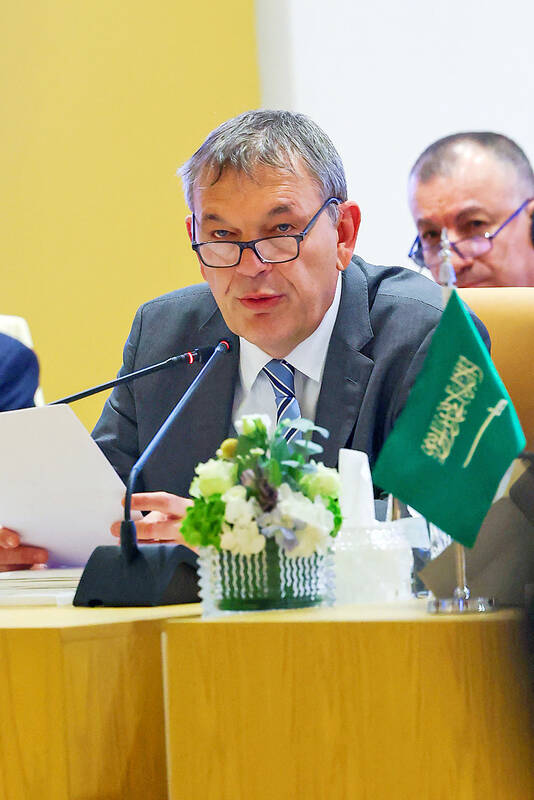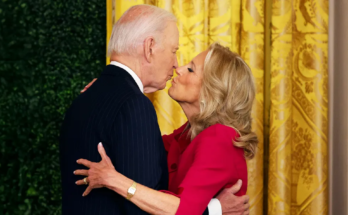‘AGAINST PALESTINE’: Philippe Lazzarini said if the UN refugee agency is denied access to the West Bank and Gaza, it would feed more instability in the region
AP, RIYADH
The head of the UN agency for Palestinian refugees on Wednesday said that newly passed Israeli laws effectively banning its activities in Israel would leave a vacuum that will cost more lives and create further instability in Gaza and the West Bank.
UN Relief and Works Agency (UNRWA) Commissioner-General Philippe Lazzarini told reporters in an interview — the first since the laws were passed — that the legislation is “ultimately against the Palestinians themselves,” effectively denying them a functioning provider of lifesaving services, education and healthcare.
UNRWA has been the main agency procuring and distributing aid in the Gaza Strip, where almost the entire population of about 2.3 million Palestinians relies on the agency for survival amid Israel’s nearly 13-month-old war with the militant Hamas group.

UN Relief and Works Agency Commissioner-General Philippe Lazzarini speaks at a meeting in Riyadh on Wednesday.
Photo: AFP
Tens of thousands of displaced Palestinians are sheltering in UNRWA-run schools. Other aid groups say the agency’s strong, decades-old infrastructure across Gaza is irreplaceable.
Israel alleges that Hamas and other militants have infiltrated UNRWA, using its facilities and taking aid.
The Israeli laws, passed by parliament this week, sever all ties with UNRWA and ban its operations in Israel.
As the agency’s operations in Gaza and the West Bank must go through Israeli authorities, the laws threaten to close its activities there as well.
The laws are expected to come into effect in three months.
If the Israeli decision is implemented “this would be a total disaster, it is like throwing [out] the baby with the water,” Lazzarini told reporters, speaking in the Saudi Arabian capital, Riyadh, where he was attending a conference to discuss conflict in the Middle East.
“This would create a vacuum. It would also feed more instability in the West Bank and Gaza,” he said. “Having UNRWA ending its activities within the three months would also mean more people will die in Gaza.”
The agency is looking for “creative ways to keep our operation going,” he said.
He appealed for support from the UN General Assembly and donors to keep providing services, and called on Israel to rescind the decision or extend the three-month grace period.
Israel has not officially communicated with the agency following the adoption of the laws, he said.
For decades, UNRWA has operated networks of schools, medical facilities and other services across Gaza and the West Bank — as well as in Lebanon, Syria and Jordan. In Gaza especially, it plays a major role in maintaining social services and the economy, as the territory’s largest single employer, and the source of education and healthcare for much of the population.
The laws threaten to shut down all those operations, affecting the education and welfare of hundreds of thousands of children well into the future, he said.
“We have today one in two persons in Gaza below the age of 18, among them 650,000 girls and boys living in the rubble, deeply traumatized at the age of primary and secondary school,” he said. “Getting rid of UNRWA is also a way to tell these children that you will have no future. We are just sacrificing your education. Education is the only thing which has never, ever been taken away from the Palestinians.”
UNRWA was established to help the estimated 700,000 Palestinians who fled or were driven out of what is now Israel during the 1948 war surrounding Israel’s creation. It now offers support to the refugees and their descendants, who number about 6 million across the region.
Lazzarini said the Israeli laws are the “culmination of years of attack against the agency.”
“The objective is to strip the Palestinian from refugee status,” he added.
International law gives Palestinian refugees and their descendants the right to return to their homes. Israel has refused to allow their return, saying it would end the Jewish majority in the country. Israel has said the refugees should be taken in by their host countries, and officials often argue that UNRWA’s services keep Palestinians’ hopes for return alive.
Israel has said that hundreds of Palestinian militants work for UNRWA and that more than a dozen employees took part in Hamas’ attack on Israel on Oct. 7 last year that ignited the latest war.
The UN has fired nine staff members after internal investigations found that they might have participated in the attack.
UNRWA has nearly 30,000 staff in the region, including 13,000 in Gaza, most of them Palestinians.
Israel also says that Hamas fighters operate in UNRWA schools and other facilities in Gaza — and has hit many of them with airstrikes.
UNRWA denies knowingly aiding armed groups and says it acts quickly to purge any suspected militants from its ranks.
At least 237 UNRWA staff have been killed in the war in Gaza, while more than 200 UNRWA facilities have been damaged or destroyed, killing more than 560 people sheltering in them.



